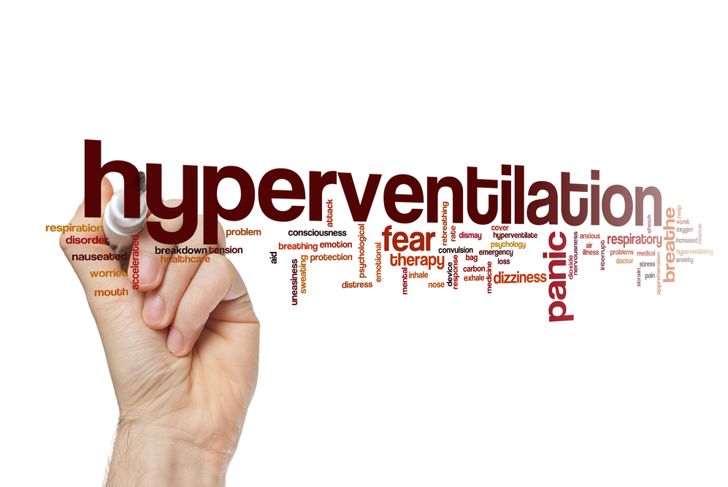Usually, breathing is an involuntary reflex. Most people go for long periods without any awareness of the rate at which they are breathing. This is because the human body automatically regulates breathing depending on the need for oxygen at that time. Hyperventilation occurs when the normal pattern of breathing is interrupted. The reaction can have various causes, both physiological and psychological. People who experience frequent episodes may require medical treatment.
What is Hyperventilation?
This occurs when a person breathes too rapidly. During an episode, the individual breathes out more air than he or she is breathing in. Therefore, the quantities of gases in the bloodstream becomes unbalanced — the level of carbon dioxide becomes too low. When levels of carbon dioxide fall, blood vessels constrict. This narrows the vessels carrying blood to the brain and reduces the amount of blood that can reach this vital organ.
Common Symptoms
The symptoms commonly experienced during hyperventilation occur because of the restriction of blood to the brain. The person may be aware that their breathing has become too rapid. They are likely to feel light-headed and faint, and may also feel tingling sensations, especially in the fingers and hands. If it continues, the blood restriction to the brain may last long enough that the person loses consciousness. It is often accompanied by feelings of stress and anxiety.
Causes
Often, hyperventilation occurs as a result of psychological distress, fear or anxiety. This is often described as a panic attack. Sometimes, people who are experiencing extreme pain hyperventilate, as can those who have suddenly lost a lot of blood. It can also be caused by taking too much of certain medications. Overuse of stimulants can also lead to overly rapid breathing. Some pregnant women may experience a form of it if their growing baby constricts their lungs.
Hyperventilation and Altitude
Traveling to very high altitudes causes hyperventilation. Any altitude over 6,000 feet is likely to produce this response because there’s less oxygen in the air at these heights. When a person reaches a high altitude, they start to breathe faster to take in more oxygen. However, they also breathe out more rapidly, leading to a carbon dioxide deficit. This leads to the dizziness people often feel in mountainous regions. However, people who live at high altitudes for long periods gradually adapt to lower oxygen levels.
Associated Conditions
Sometimes it occurs due to an underlying medical condition such as a lung infection. Chronic lung conditions such as chronic obstructive pulmonary disease (COPD) and asthma can cause rapid breathing and hyperventilation. Diabetic ketoacidosis can cause some people with type 1 diabetes to hyperventilate, as can cardiovascular problems such as a heart attack.
Treating Hyperventilation
In many cases, people can treat it without medical attention. The aim of treatment is to reduce the rate of breathing and gradually increase the amount of carbon dioxide in the blood, allowing blood flow to the brain to return to normal. If the person feels very anxious, having a trusted caregiver guide them through the process may help. Although the symptoms are unpleasant, it’s important to remain calm. Taking slow, deep breaths helps restore the balance of carbon dioxide in the blood. Some people find breathing through pursed lips can help to slow their breathing down. Exercise may help some people, although if faintness is a symptom, it is best to avoid raising the heart rate.
Diagnosis
A doctor can often diagnose it from a description of the symptoms. If one is experiencing rapid breathing and lightheadedness associated with stress or anxiety, they could be diagnosed with hyperventilation syndrome, as well as an associated mental health condition such as an anxiety or panic disorder. Various medical conditions can cause rapid breathing and faintness, however, so the doctor may order blood tests to rule out any underlying condition before diagnosing hyperventilation syndrome.
Medication for Hyperventilation
If a person is hyperventilating often or any instances are causing distress, a doctor may prescribe medication. As it is often caused by stress or anxiety, anti-anxiety medication can reduce events or calm the individual when one occurs. If hyperventilation is spurred by a medical condition such as asthma, doctors can prescribe specific medications to treat this condition. Getting the underlying condition under control is likely to reduce or eliminate these episodes.
Preventing Hyperventilation
As elevated stress levels often cause hyperventilation, lifestyle changes that reduce stress can be helpful. Strategies such as breathing exercises, meditation, and mindfulness can all lower stress levels. Many people find regular exercise can help prevent episodes of hyperventilation. If you are concerned about hyperventilation, seeking medical help can alleviate fears, and the doctor may be able to recommend additional steps to minimize episodes.
When to Seek Help
Anybody experiencing hyperventilation for the first time should seek help from a doctor, especially if the cause is unclear. People who do this due to stress or anxiety can usually make a full recovery without long-lasting issues. However, assuming that it is always stress-related can be dangerous, and it is best to have a doctor rule out underlying illness.

 Home
Home Health
Health Diet & Nutrition
Diet & Nutrition Living Well
Living Well More
More




















